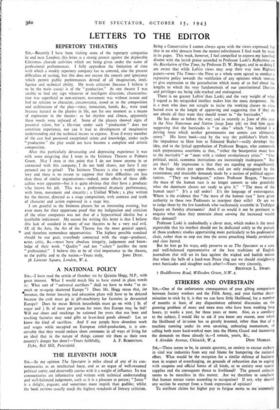THE ELEVENTH HOUR
SIR,—In my opinion The Spectator is miles ahead of any of its con- temporaries as an intellectual force, and as an organ of well-reasoned political sanity, and deservedly carries with it a weight of influence. Its war commentaries are informative and written with technical understanding and well-balanced judgement, such as it is a pleasure to peruse; " Janus " is a delight, piquant, and sometimes more impish than godlike; whilst the book reviews usually reach the highest, standards of literary criticism. Being a Conservative I cannot always agree with the views expressed, lout that in no whit detracts from the mental refreshnient I fmd week by week in its pages. This week, however, I feel compelled to express my horrified dissent with the lavish praise accorded to Professor Laski's Reflections on the Revolution of Our Time, by Professor D. W. Brogan; and in so doing I am aware that while Leftist views may seep their way into Rightest papers—even The Times—the Press as a whole seem agreed to conduct a repressive policy towards the ventilation of any opinions which venture to give expression to the perturbation which many of us feel about the lengths to which the very fundamentals of our constitutional liberties and privileges are being side-tracked and endangered.
There is no greater Leftisr'than Laski; and the very weight of what I regard as his misguided intellect makes him the more dangerous. He is a man who does not scruple to incite the working classes to class hatred even to the length of approving and suggesting that if they do not obtain all they want they should resort to " the barricades."
He has done so before the war; and as recently as June of this year in the New Statesman and Nation (issue June 5th) we find him again suggesting that the barricades is "an idea" which " has behind it a driving force which neither governments nor armies can ultimately arrest." His latest book—and by the way the publisher's blurb has the impudence to liken him to Edmund Burke!—really-develops this idea, and to the lyrical approbation of Professor Brogan, who commends such preposterous assertions as that, " either the bourgeoisie must bow to the inevitable " or " meet with a violent revolutionary crisis." "Our political, social, economic institutions are increasingly inadequate." But are they? My impression is that they are standing up magnificently to the huge strain put upon them, and are only endangered by the extortionate and insatiable demands made by a section of -political oppor- tunists. " They are inadequate," echoes Professor Brogan, " because the mass of the human race is no longer content to take gratefully what the dominant classes are ready to give it." " The mass of the humari race? " It's a tall order! It's the language of extravagance. Where is the evidence that " the mass of the human race " have given authority to these two Professors to interpret their wills? Or are we to judge them by the few hundreds who vociferously assemble in Trafalgar Square on Sunday afternoons? And if so would it not be pertinent to enquire what ideas they entertain about earning the increased wealth they demand?
Professor Laski is undoubtedly, a clever man, which makes it the more regrettable that his intellect should not be. dedicated solely to the pursuit of those academic studies appertaining more particularly to his professorial chair, rather than to step out into the arena preaching bloody revolution and class hatred.
But let him go his ways, only preserve to us The Spectator as a sane and well-balanced representative of the best traditions of English journalism that will set its face against the wicked and foolish notion that when the bells of a hard-won Peace ring out we should straightway erect barricades and slaughter each other!—Yours very sincerely,


























 Previous page
Previous page